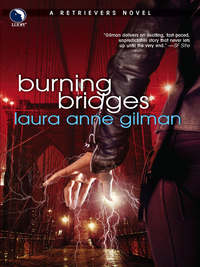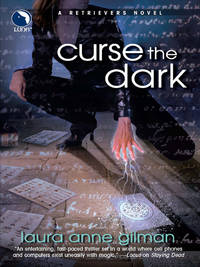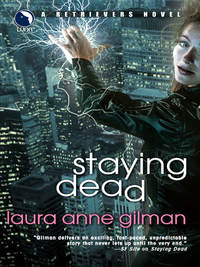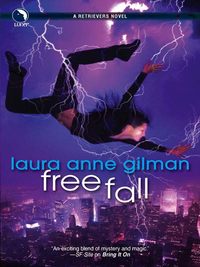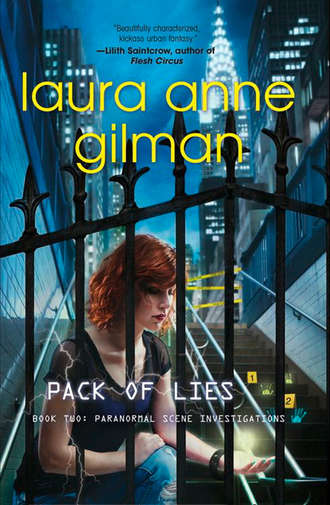
Полная версия
Pack of Lies
“We’ve done everything we can right now,” he said to them. “Ian will be back in the morning with the girl’s testimony and the ki-rin’s deposition—” he hoped; his partner hadn’t pinged to say he’d be late, but Ian was not what you’d call a steady-goer “—and then we’ll be able to start putting the pieces together for our report. Right now, you’re just chewing on your tails, and that’s starting to chafe mine. So. Go. Home.”
He shooed them down the hall, noting with concern that they didn’t even stop at the elevator, but headed for the stairs at the end of the hallway. He understood their aversion—none of them were going to forget the boy who had died anytime soon—but it wasn’t good that they were now so conditioned to avoid it. He was going to have to do something about that, as well as the situation with Pietr.
He stopped to push the button for the elevator, meaning to set an example, and realized that he still had the flyer in his hand. Curious, he unfolded the salmon-colored paper and scanned the text, and then stopped and read it again, more carefully. On the surface it was an advertisement for a fumigation service. On the surface …
He had seen the wording before, on a different flyer, on his own door.
Do you have problems with unwanted creatures in your space? Looking for a way to evict them forever without chemicals or fuss? Call us.
He hadn’t thought anything about it then, piled with the other flyers and junk mail that seemed to accumulate every week; current use was one of the best natural cockroach repellents, and his building didn’t have a rat problem that he was aware of. Now, on its own, the wording seemed somehow more … something. He didn’t know what, but it made him uncomfortable.
He was a cautious, suspicious sort by training as well as natural inclination, and he didn’t believe in ignoring his instincts when they said something was wrong.
It was probably nothing; he might simply be overreacting. Or it could be important. That was his job, too; to scout things that might be important, and keep Ian informed. More, he didn’t like something about the wording of these flyers—or the fact that there was no company name on it, no website or email, only a phone number. That sort of thing raised a definite red flag—it meant someone was trying not to leave a trace. Pay-as-you-go cell phones were easier to dump than websites these days.
It wasn’t all current, this gig. Sometimes you had to use Null methods, too.
“Sharon,” he called, stopping her before she went into the stairwell. “Hang on a minute. You still in contact with the legal types you used to work with?”
She had come to them via a Talent-heavy law firm, specializing in discrimination cases and medical malpractice.
The blonde stepped back into the hallway, letting the others go on down the stairs without her, and looked at him inquiringly, switching easily from off-duty grousing to professional competence. “Yeah, why?”
He uncrumpled the paper, and handed it to her. “I need you to do some digging for me. Quietly.”
It had been a long day filled with not much of anything, and Aden was tired. She heard the door open, the sound of Carl’s steps in the hallway, but felt no urge to get up and meet him. The divan she was sitting on was comfortable, and he would come to her if there was anything to say. There was a skitter of claws as the dog was released from its leash and went into the kitchen to see if there was anything in its bowl.
His footsteps moved along the tiled hallway, down into the sunken living room, then stopped. She could feel the change in the air, but kept her back to him, looking out the floor-to-ceiling windows that ran the length of the wall. The beach was empty save for a single jogger coming down the sand toward then. The high season was still months away, and she would be gone by then, the lease on this house expired. She didn’t know where she would go, then. Maybe Miami. Maybe Canada. Not home, not yet. She was not yet ready to deal with them. Not while they still slunk about like whipped dogs, too hesitant to do what was needed.
Carl cleared his throat. “They’ve hired your brother.”
The bile swirling in her throat at his words was an old, not-unwelcome friend. There was only one “they” in this house. The Mage Council. Specifically to her, the Midwest Council, her home and kin, but she knew he meant the Eastern Council, the region her brother lived in now. They were all the same in the end, even if they claimed autonomy and embraced geographic limitations. The elite of the elite; the decision-makers, the voice of reason and control against the human tendency to excess. She had spent her entire life living up to their standards, hoping to one day be strong enough, respected enough to be asked to join the seated members, to be a decision-maker herself.
Her childhood idols had feet of clay.
She sighed, hugging her knees more tightly to her, still watching the blue-gray waves rolling up onto the shore. “And what should I do about that, rush in to protest? Try to save them from their folly? Because that ended so well, last time.”
“The boy’s death was not your fault.” His reaction was automatic, but heartfelt.
“Of course it wasn’t.” She had not attacked with lethal force, only attempted to warn her brother, to force him to acknowledge the wrongness of his path. It was pure sad chance that the killer they had been chasing attempted to take them out at the same time, and that the elevator had failed in the resulting current cross fire and fallen, with the boy inside. Regrettable of course, but responsibility had to go to the owners of the building, who had not maintained their power grid properly. It merely reinforced her belief that Ian’s foolhardy quest would bring only grief and disaster to their people, no matter his good intentions. “But the Council needed someone to blame, and my brother was once again golden. He challenges their decisions, denies their authority, abandons everything that we were raised to believe … and they not only do not slap him down, they hire him. It would make me laugh, if it wasn’t so horrifying.”
Carl came farther into the room, but did not sit down, instead standing behind her. She could see him reflected faintly in the glass; hands behind his back, silver hair uncovered, like a soldier reporting to his general. The thought pleased her.
“And so he is allowed to spread his theory further….”
Aden looked at the reflection as she spoke. “And there is nothing that I can do to stop him. I am still banned from going within two miles of his precious puppies, forbidden to speak against them for another year.” The injustice of it made her want to spit. Never mind that within a year they would inevitably be out of business, their methods reviled, and her brother doubtless disgraced and discredited again. Who knew what damage they could do to the fabric of the Cosa Nostradamus in a year? “There is nothing I can do,” she said again, this time more softly, and her fingers unclenched, smoothing the nubby fabric of the divan underneath her as though petting a cat.
“Not directly, perhaps.”
She didn’t move, didn’t stop stroking the fabric, or watching the waves rise and unroll. Both soothed her, kept her from dwelling on the injustices of the world. “And … indirectly?”
He didn’t respond, his glass-shadow not moving, waiting at relaxed attention, and eventually curiosity forced her to turn around on the divan and look directly at him.
“Indirectly? And don’t give me that ‘the enemy of my enemy is my friend’ crap. I have no desire to align myself with some radical group or lunatic antimagic front.” Her voice was sharp, and she was pleased to see him flinch. Aden was a Stosser: she had objections to her brother’s actions, yes, but she would be damned if she would lend her legitimacy to some nutcase who wanted them to deny their heritage and abandon current, or something equally insane.
“What about ‘the enemy that can be used is a useful tool’?”
He looked entirely too poker-faced—there was something he was pleased about. She studied him a moment, putting her thoughts in order. She disliked speaking before she knew exactly what she was going to say, especially on matters of such importance. Carl was far too good a planner to bring her smoke and mirrors; something was up. Something that pleased him, and thought it would also please her.
“All right,” she allowed, leaning back and nodding. “You have my attention.”
four
By the time we reached the pecan tart, I’d gotten the ground under me, again, and was feeling kind of silly for overreacting. “Dinner was, as always, delightful.” It was—J was a fabulous cook, and an even better conversationalist. “But I should scoot—they’re going to expect us in the office at Oh-god-Early again.”
J smiled briefly, honestly amused. “The thought of you being a nine-to-fiver …”
“More like eight-to-eight,” I said, and like that was a trigger, a yawn almost cracked my jaw open, loud enough that I was embarrassed. “It’s not the company, I promise.”
“You used to run three days without sleep,” he observed, standing to gather plates from the table. “You’re getting old, Bonita.”
“And you’re getting younger,” I said, standing to help him clear the table. A wave of exhaustion hit me, almost knocking me back into my chair.
“Bonita?” J moved pretty fast for an old guy. “Are you all right?”
“Yeah, just …” I had to double-check to make sure what the problem was. “Wow. My tank sprang a leak somewhere.” I wasn’t about to tell J how much our work took out of me—it would just be another thing for him to worry about.
There is no sigh like a mentor’s sigh. “When was the last time you sourced, Bonnie? Not merely a hit here or there, either.”
I couldn’t remember, so I just shrugged, a bit of body language that I knew would drive him crazy. Even as a kid I’d forgotten to recharge regularly … back then, it hadn’t really mattered. I could go months, sometimes, without hitting empty. Now? Two days seemed to be the max.
There were different ways to recharge, but mostly it came down to choosing between wild current, or man-made. Wild current was exactly that—magic that formed from a natural charge. Current ran alongside electricity, in ways we still didn’t quite understand but were more than happy to use. So thunderstorms, ley lines, any focused electrons we can lay magical hands on, that was how we sourced wild current. Nick claimed he knew someone who could pull current directly from the atmosphere, but I think he was full of shit, because you’d either get so little it would be useless, or overrush your brains out and leave you a twitching, grinning wreck. No thanks.
Fortunately for us, anything that carried electricity also carried some amount of current. That was where man-made current came from—modern generators. The old stories were a crock—modern technology didn’t kill magic, it enhanced it, gave it another burst of always-accessible power in the form of generated electricity. Thank god, because I really hated sourcing wild. A portable computer or phone: that was a small hit. An apartment building’s electrical system: more. A power plant? Smorgasbord. That’s why so many of us lived in cities: 24-hour access where something was always turned on and working.
And why, every now and again, the entire power grid went dark, because some nitwit Talent had pulled too much, too hard. Bad enough to short out your own electronics. Taking down the grid got you Idiot Hall of Fame status.
“Bonnie …”
I smiled up at him, as innocent a look as I could manage, and he gave up. “I’ll send you home, but you have to promise to recharge, all right?”
I held up my hand in solemn oath, and he believed me.
J was a master craftsman: he dropped me neatly into the middle of my living space, with only a slight wooziness that passed with a blink and refocusing. I sat down on the nearest love seat and did another quick check of my core. Mmm. All right, yeah. There wasn’t anything nearby that would give me a full soak, but I could fix the immediate damage, at least.
I sank into a half fugue, and siphoned off a thin trickle, not from my own building, but the newer, nicer one across the street. They had cleaner wiring, so I was less likely to cause a burp in their service, or fry someone’s computer. I’d do better this week, when I had time to hunt down a stronger source.
The recharge took care of the wobblies, enough that I could have gone through my normal bedtime routine. Instead, I stayed where I was. Talking to J had helped, the way it always did—that was what a mentor did, once they finished kicking you into shape—but I still felt worn down. Was it just this case hitting me hard? Or was it the job itself? Was I not hacking it? The thought scared me more than anything else ever had.
I loved this job. I couldn’t, I wouldn’t wash out.
At that moment I wished that I had a dog. Or a cat, or even a gerbil. Something I could pet when I came home, and cuddle, and know that it loved me. Okay, maybe not a gerbil. Rodents were nasty. But a cat, maybe. A cat would be good.
I’d never had a pet before; there was only room for one animal in J’s apartment and Rupert was it, in no uncertain terms.
“Worry about a cat later,” I told myself, leaning back and staring at the ceiling. “If one is meant to come, it’ll come. Isn’t that how cats worked?” I yawned, aware that, even recharged, my brain was getting fuzzy. I should go to bed. Should. Yeah. Right.
Even though I love my loft bed—it’s big enough for two, comfortable enough to live in, and sturdy enough for a pillow fight, or any other kind of energetic activity—the thought of climbing up there right now was too much effort. It wasn’t just the current-drain, or even the emotional seesaw I’d been riding. We’d been pushing hard, the organ-leggers case and now this, with no real downtime between. Was this what it was going to be like once we convinced the naysayers, and cases came on a regular basis?
The thought both thrilled and horrified me.
I ended up dozing on and off, curled up on the sofa, instead. I woke up a few times during the night, once from a dream of a large black cat sleeping on my chest, and then again when a truck rumbling by set off a series of car alarms down on the street, and then finally overslept, waking up only when the sound of kids on the street outside wormed their way into my consciousness.
Oh, fuck. I wasn’t late—yet. But there was no time for my usual putter-around-the-apartment wake-up routine. A fast shower got me clean, and a rummage in my closet resulted in an easy-to-manage outfit of long black skirt, leggings, and black cotton sweater over my lace-up stompy boots. I managed to make it out the door by ten after seven, feeling like crap, but still on time. Thank god we didn’t have a particular dress code.
Manhattan in the morning is a living stream of purpose; everyone’s got a place to be and a problem on their mind. That doesn’t mean it’s an unfriendly place—just busy and preoccupied. Personally, I love it. I’m a social creature but there are times and places you just don’t want to do more than grunt at your fellow human being.
This morning, though, my usual comfort level was replaced by something a lot less … comfortable. Walking to the station, and standing on the platform waiting for my train, I was acutely aware of everyone around me, not in the usual “get your elbow/cell phone/coffee away from me” sense but judging distances, evaluating body language, watching anyone who got too close … specifically anyone male.
Huh. It wasn’t that I didn’t do this sort of thing all the time. You have to, wherever you are. It’s just basic common sense and security, and when you’re being trained to observe and detect, that goes into overdrive. But normally it was background processing, something I did without being really aware, unless a warning signal pinged my forebrain. Today … it was all front-and-center consciousness, and very much focused on gender. The difference was like between healthy skin and abraded flesh. Every whisper of touch, every possible glance from a stranger, made me shudder in almost physical discomfort.
It wasn’t worse than the cold numbness of yesterday, but it sure as hell wasn’t better, either. What the fuck was going on?
I managed to clamp down on it long enough to get on the arriving train without screaming or snarling at anyone. Once on, I slipped and slid my way into an empty seat at the far end of the car, between a young Asian woman in a suit, eyes closed as though she were sleeping, and a large, middle-aged black woman with a bundle of knitting in her hands. She radiated a don’t-mess-with-me-this-morning attitude that was soothing.
I exhaled, forcing myself to calm down. The car was full but not packed, and there was actually enough room that people weren’t in each other’s personal space, which always made for a more relaxed atmosphere. I had a book in my kit, but it didn’t feel like a reading morning. I looked down, and only then noticed that in my rush I’d put on mismatched socks. Great. My fashion style was a little on the fashion-risk side sometimes, but that was going to be tough to carry off as intentional. I pushed the brown one down into the ankle of my boots and closed my eyes instead, trying to get into work mindset.
Usually it wasn’t a problem. While I’m not a morning person, the hum of the subway’s electrical power and the jolting of the train typically eased me into the day, while the promise of a puzzle—either a training session exercise or, as now, an actual job—to chew on got my brain to agree to function.
But this case … Damn it, I was the one who stayed cool. But my brain wasn’t cooperating, even after a night’s sleep and a recharging hit, so I couldn’t blame it entirely on exhaustion.
It couldn’t be the job itself: we had all the answers already. All we had to do was organize and present the evidence. But I needed to be in a nicely grounded state of mind to do that kind of sorting and organizing, and it wasn’t happening, even after spending time with J. The sleeplessness, the raw nerves, and the lack of ability to dress myself decently were all warning signs that I was off-kilter, still. The unease, the cold numbness, the discomfort within my own skin … not good.
When I forced myself to look at the emotional side, rather than the facts, it was—duh—obvious. The girl, what had happened to her. It was tough for me to see what happened to her as a puzzle to be solved, a question to be answered, and nothing more.
I tried to focus again on the hum of current in the third rail, letting it trickle into me like bittersweet honey. That helped, but the tinny crap music pumping out way too loud through the ear-buds of the guy standing in front of me was seriously annoying, and I almost wished that I had a cup of coffee just so I could accidentally-on-purpose slosh some over his expensive sneakers. When the sound suddenly spluttered and died—I suspected that another Talent in the car had taken offense and sporked him—it cheered me significantly.
Small revenge is large comfort, some days.
Between that and the hum of current, by the time the train dumped me out at my stop, my mood was better and my nerves under control. I tromped up the stairs, enjoying the ringing noise my boots made in the stairwell because some days I really am seven, pushed open the office door, and headed directly for the coffeemaker, shedding my coat as I went.
“Hey, girl.”
“‘Morning.” I poured myself a cup of coffee and leaned over to see what Nifty was doing with the bits of paper he had laid out on the coffee table. It was a casual move, nothing I hadn’t done dozens of times in the past six months, but this time I hung back just an inch or two more distant than I normally did, not resting my hand on his shoulder for balance. It took me a minute to realize it, and another one to realize why.
Damn it, this was Nifty. He was a good guy. He was on our side.
He was a guy.
I guess my nerves weren’t quite as under control as I thought.
Whatever calm I’d gotten went sizzle like water on a griddle, my core shifting from its usual cool loops of neon to something more jagged and hot. Bad. Very bad normally, and even worse here, in the office. Be calm, Bonnie, I told myself. Be still and controlled, that’s what you do, remember? You’re the one who has the most excellent control.
Knowing why I was reacting this way, and that logic wasn’t going to work, not right now, didn’t help. All I could do was deal with it, and try not to let it get in the way of the work. With that in mind, I consciously leaned forward to get a better look at what he was doing, even as I smoothed the jagged spikes back down into cool loops through sheer force of will. I would not let nerves show. Would not.
“I really wish I had a camera right now.”
I twitched, and looked up at Pietr, who had been his usual silent self until now, meaning I hadn’t even realized that he was in the room. He had an amused look in his gray eyes, so I looked down to see what the hell he was talking about, and started to laugh. Me, my white-blond hair, pale skin, and black outfit, and Nifty’s dark skin and white sweater—yeah, I could see where we’d make an irresistible target.
The tension broke, a little, and I could function again, control slipping back into place naturally.
“You try bringing a camera in here,” Nifty said, mock-scowling, “I give it a week, tops, before it goes snap, fizzle, pop.” Warding could only do so much; the moment current was free of either core or spell, it looked for an electrical stream to hook up with, the more powerful the better. That was why we’d trashed the original expensive coffeemaker for a simpler, if still wicked, brewmaster, and why there was only one phone and one computer, and both were down in Stosser’s office, where nobody did any workings by order of the Big Dogs.
“So what’re you doing?” I asked Nifty, leaning in a little more easily now.
“Girl had a bunch of scraps in her pocket, got ‘em in this morning, courtesy of one of Venec’s contacts. Looks like they were napkins or something, but there’s writing on them.”
I took a closer look. They were smudged and incomplete, but I recognized them. “Oh. She was collecting numbers.”
“Numbers?”
“Phone numbers.” I looked at him in astonishment. “Dear god, Nift, for a jock you sure are innocent….”
He stared down at the bits of paper, trying to see what I saw. “That’s a lot of numbers for a virgin to be collecting.”
I resisted the urge to pat him on the top of his buzz-cut head. “It’s not about calling them, it’s about getting them.” He looked at me and I raised my hands palm-up in a don’t-ask-me gesture. “Not my kind of game, but some do it. So our girlfriend was playing the game but not paying the pot.”
“Looks like.”
Quiet fell in the room as we both stared at the pieces of paper. Magic was all sorts of fun and splashy, but this was how we did most of the grunt work: Everyone put some elbow grease and some brain sweat into the mix, and we stirred it with a big stick until it smelled right. Another Venec quote.
Pietr put down the file he’d been reading and looked over the table at the napkins, too. “There are three different bars there, at least.”
Nifty looked up at him, then down again at the table. “How can you tell that?”
“Different paper. Look at the textures.”
“We supposed to go check each bar, see who she might have chatted up?” He sounded discouraged.
“We should,” Pietr said.
“Why?” I tilted my head and looked at my coworker, playing devil’s advocate. “You going to claim that she asked for it, somehow? That maybe she blew one of these guys off, before, and that’s why they attacked her? Doesn’t matter, to our job. We’re not here for the why, just the who and the how. We know who did it. One guy’s dead, the other’s in custody, and the cops will get the story out of him. All we have to do is make sure the ki-rin’s skewing was clean, or whatever the cop terminology is, and the case is closed. No need to poke around anything that happened before, right?”


